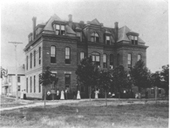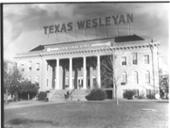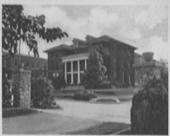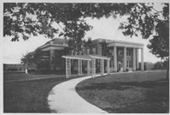


At Texas Wesleyan, our intentionally small campus has a Texas-sized reputation and a rich history. Get to know a little more about the University and its "Smaller. Smarter." tradition.
Texas Wesleyan University was founded by the Methodist Episcopal Church, South, in 1890.
A committee under the direction of Bishop Joseph S. Key explored locations for a campus and settled on a site east of Fort Worth donated by area pioneers, A.S. Hall, W.D. Hall, and George Tandy. Originally called Polytechnic College — which literally means "many arts and sciences" — the school held its first classes in September 1891, with a handful of faculty members and 111 students.
In 1902, H.A. Boaz assumed the presidency and managed a period of moderate growth. He conceived the idea of a new university for Southern Methodism and planned to develop Polytechnic College into that university.

Ann Waggoner Hall was Texas Wesleyan's original College Hall

The Oneal-Sells Admin Building is a Texas Historic Landmark

Dan Waggoner now houses Texas Wesleyan's School of Education

Ann Waggoner Fine Arts Hall is Home to Texas Wesleyan's vibrant music department
When Dallas was selected by the church leaders as the site for Southern Methodist University, the Polytechnic campus was designated the Woman’s College for Southern Methodism, eventually becoming Texas Woman’s College in 1914.
Young women from around Texas and the Southwest attended Texas Woman’s College as it developed into a major force in North Texas. However, faced with dwindling resources during the Depression, trustees voted to close the school in 1931.
A merger with the financially secure Texas Wesleyan Academy in Austin kept the doors open and created the new institution of Texas Wesleyan College in 1935. Men were readmitted that same year.
Since 1935, Texas Wesleyan has remained a co-educational liberal arts institution with an increasingly comprehensive academic and student life program. In addition to strong undergraduate programs, the University added graduate programs in education in the 1970s and in nurse anesthesia in the 1980s.
After contemplating a relocation of the campus to a west Fort Worth site, Texas Wesleyan renewed its commitment to its historic Polytechnic Heights location by building the Eunice and James L. West Library. Recognizing the growth in programs, trustees changed the name of the institution to Texas Wesleyan University, effective in January 1989.
Texas Wesleyan has historically combined service to a residential population along with its strong commitment to a commuting and adult population.
To add flexibility in the scheduling of courses and to recognize the special needs of adult learners, the University added the C.E. Hyde Weekend/Evening Program in 1994.
The University established a campus in downtown Fort Worth in 1997 with the relocation of the Texas Wesleyan University School of Law, which was established in 1992 following the acquisition of the former Dallas/Fort Worth School of Law. In August 2013, the law school was sold to Texas A&M University.
The Graduate Programs of Nurse Anesthesia has grown into the largest in the nation, delivering courses to students throughout the United States.
The University has cooperative programs with a number of high schools that allow seniors to enroll in university classes for credit and become familiar with the university experience.
Throughout its history, the University has remained closely affiliated with the United Methodist Church. The University maintains special relationships with several United Methodist congregations, and some of the trustees are representatives of the United Methodist Church.
In keeping with Methodist tradition, the University welcomes individuals of all faiths and is thoroughly inclusive in its practices.
Texas Wesleyan University, guided by its deep Methodist heritage, provides transformational learning experiences and research opportunities to a diverse group of students to develop their full potential as individuals and as members of the world community.
The university’s faculty and staff engage in scholarship and research that inform teaching and advance knowledge and understanding, as well as innovative teaching skills and delivery modalities to afford each student individual attention to develop critical thinking, analytical reasoning and creative problem-solving skills through a small community approach that allows tailored student experiences in and outside the classroom.
With a belief that a liberal arts and sciences education develops the mental agility and social awareness to elevate socioeconomic mobility, the university’s faculty and staff are dedicated to facilitating success among students from all backgrounds in all levels of undergraduate, graduate, and professional programs in persisting to college degrees that enhance their own lives, the lives of their families, and the strength of their communities.
Texas Wesleyan aspires to be a values- and student-centered university where motivated students prepare for graduate school and leadership in professional careers.
This vision is premised upon the understanding that professional employers seek individuals who have attained the essential skills of critical thinking, analytical reasoning and creative problem solving.
Texas Wesleyan believes that the best way for undergraduate students to learn these skills is in a liberal arts setting through intentionally small classes led by gifted faculty who are committed to student success.
This vision also recognizes that most students will need graduate professional degrees to further their careers and that these same skills are required for admission to and successful completion of graduate professional programs.
Realizing that most students will enter the workforce before returning to graduate school, Texas Wesleyan University will maintain graduate professional programs of high quality in formats that are accessible to working adults. These programs will focus on deepening and broadening critical thinking, analytical reasoning and creative problem solving skills in the context of professional content.